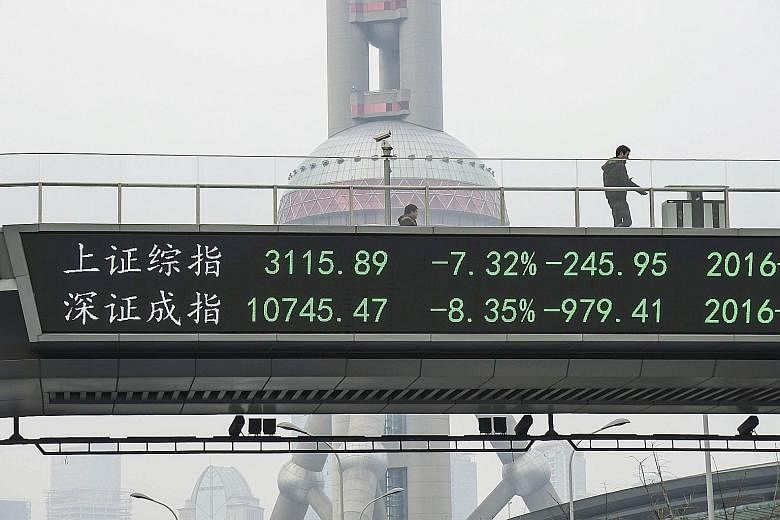Ask investors like Mr Song Deyong about the circuit breakers that kicked in on China's share markets again yesterday and you might not get a polite response.
The mechanism halted share trading so suddenly that Mr Song had no time to react, leaving him with losses of about 10,000 yuan (S$2,180).
"When the first circuit breaker was triggered, I already knew it would be another bad day," the financial industry worker, who has about 50,000 yuan invested in stocks, told The Straits Times. "People view the activation of the mechanism as a negative signal, and so it affects investor sentiment as well."
It may be scant consolation for Mr Song, but he will be relieved to know that the circuit breaker mechanism is suspended with effect from today following two days of mayhem, according to a late night report from the China Securities Regulatory Commission.
Circuit breakers, which are designed to prevent wild market swings, are new to the Chinese markets, and experts fear they may be doing as much harm as good.

A fall of 5 per cent in the CSI 300 - an index of large-capitalisation firms on both the Shanghai and Shenzhen exchanges - triggers a 15-minute halt for stocks, options and index futures, while a move of 7 per cent shutters the market for the rest of the day.
That occurred yesterday after shares fell more than 7 per cent within a half hour of the opening bell, and some blamed the circuit breakers for the panic.
"Instead of a calming effect, it heightened panic in the markets as the circuit breakers cut off market liquidity, and investors, afraid they won't be able to sell, rushed to do so instead," said Mr Xu Dewen, an investment consultant with China Investment Securities.
Ms Janice Lim, head of North Asian equities at Lion Global Investors, said the speed at which the circuit breaker was triggered also surprised investors.
"When the first trigger was hit, investors took the 15-minute break to plan their exit strategy instead, and liquidity pressure sent the market down to the negative 7 per cent level swiftly," she told The Straits Times.
Many of China's retail investors - who drive more than 80 per cent of transactions - are speculators, and therefore influenced more by sentiment.
HSBC's head of China equity research, Mr Steven Sun, suggested tweaks like raising the threshold to trigger the mechanism.
Last year, China's A-share market dropped over 5 per cent in intra- day trading 33 times and over 7 per cent 11 times. This means that the rules could be triggered for 15 per cent of the trading days throughout the year, Mr Sun noted.
"(But) trial and error is an integral part of China's reform efforts, and we are optimistic that regulators will take action in the coming months," he said.
China's securities regulator spokesman, Mr Deng Ge, virtually acknowledged that on Tuesday, stating that policymakers need to "gradually explore, gain experience and make adjustment" to the rules.

